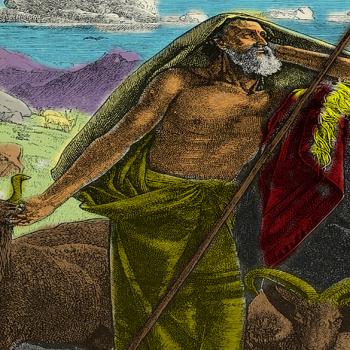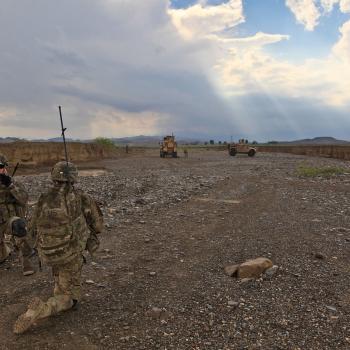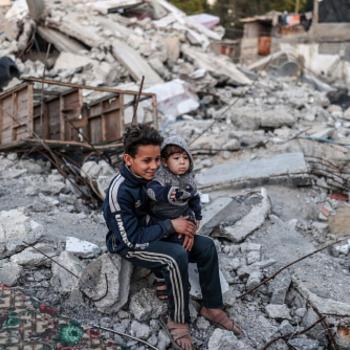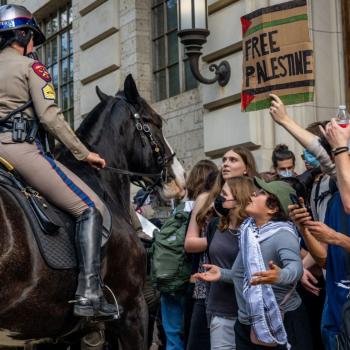
Monday: Read Revelation 5:1-14
As I noted in yesterday’s reading, the heavenly vision (4:1-16:21)—the second story (the main story) in the book of Revelation—opens with John being taken into heaven and brought before the throne. The throne room scene (4:1-5:14) encourages the readers to not be afraid of the powers of the world because, although it may appear that they are in control, the reality is that God is the One on the throne.
In 5:1-14, we learn that the Father has a scroll in His hand (1). The Scroll most certainly represents God’s sovereign will. And on it are the answers to the book of Revelation’s key questions: “How will the nations be redeemed” and “How will the creation be restored?”
There is an initial problem, however. John learns that no one is worthy to open the scroll (3-4). Then John then hears from one of the elders that the lion is worthy to open the book (5). When he looks, however, he “sees” a slain Lamb (6).
This is a major key to understanding the book of Revelation. God’s sovereign plan will unfold because the Lamb (Jesus) was slain and is worthy to take the Scroll and “break its seals” (5:9). In fact, after Jesus takes the Scroll, He receives worship (8-14) from the very same creatures that worshiped the Father in 4:1-11.
In 4:1-11, the Father was worthy of worship because He is sovereign and because He made all things (4:8, 11). In 5:1-14, Jesus is worthy of worship because He “was slain” (12) and because He has “purchased for God with Your blood men from every tribe and tongue and people and nation” (9).
Questions to ponder/discuss:
- Recognizing that Jesus is the slain “Lamb” is a critical factor for understanding the book of Revelation. Jesus is called the “lion” only once, but he is called the “Lamb” twenty-seven times. Jesus rules, in other words, not as a lion—after all, that is how the nations rule—but as a Lamb. The nations operate by means of lion power, which exerts itself by means of force and oppression, most often at the expense of the poor and the marginalized (which in Rome was upwards of 90% of the people). Lamb power, however, exerts itself by sacrificially dying for the sake of others.
- In light of this, read Mark 8:34 and discuss what you think Jesus may have meant by cross-bearing.
- Read Matt 6:19-34. Note that Jesus connects the fact that we cannot serve two masters (Matt 6:24) with the fact that we should not worry about food or clothing (Matt 6:25-32). It is important to recognize, when reading Jesus or the book of Revelation, that these two go together. That is, following Jesus and forsaking the powers of this world, may well result in the deprivation of food and clothing. To which Jesus responds, “Why do you worry?” Jesus assures us that just as the Father cares for the birds and the lilies so He will care for us. This, of course, does not mean it will be easy. That, in fact, is the point. What do you think of this?
Tuesday: Read Revelation 6:1-8 (Mark 13:1-13; or Matt 24:1-14; or Luke 21:5-19)
In the story of the book of Revelation, Jesus takes the Scroll and will break its seals in order to reveal its’ contents. As Jesus begins to open the Scroll, one seal at a time, John describes something tragic that occurs on the Earth.
To understand this passage, and the narrative of the book of Revelation, we must first recognize that the Scroll cannot be read until all the Seals are broken. This means that the Seals do not represent the unfolding of God’s will.
Instead, the account of the Seals represents what happens when humanity continues to rule. They occur while we are awaiting the revealing of the contents of the Scroll.
In addition, it is important to recognize that the account of the first four Seals (1-8) greatly parallels Jesus’ words to His disciples regarding the destruction of Jerusalem (Mark 13:1-13). Jesus had explained to His disciples that the destruction of Jerusalem would not happen immediately and they must be prepared to endure. John appears to be announcing the same thing to his readers.
We learn then from the account of the first four Seals (1-8), that until the end comes, there will be false prophets and false Christs (1-2), wars (3-4), famines (5-6), and death (7-8). This description, of course, relays what has been happening in every generation since humanity first rebelled against God. In other words, as Jesus opens the first four Seals, we learn that life will continue as it always has for a time.
The Seals indicate that God’s ultimate plan of salvation and redemption will not be completed immediately. Instead, there will be a delay.
This also means that the presence of false prophets and false Christs, wars, famine, and death are not something that God brings about. Instead, they are the result of human rule—which God allows to continue until His will (the contents of the Scroll) is accomplished.
It is also important to recognize that the effects in the account of the opening of the first four Seals are also suffered by the people of God (this will become apparent in the account of the Fifth Seal: 6:9-11). That is, false prophets and false Christs will attempt to deceive us. Just as the Nicolaitans in Ephesus (2:6) and Pergamum (2:15), the false prophets in Pergamum (2:14), and “Jezebel” (2:20) in Thyatira—whom God “time to repent” (2:21).
Questions to ponder/discuss:
- The account of the first four Seals conveys that life will continue as normal for some time, and that this period will be marked by the suffering of God’s people. It is important to understand that the Lord’s delay in bringing about the consummation of His kingdom is an act of love. It may not seem like it since the continued rule of humanity brings devastation and destruction. God does so in order that all may have time to repent. This, as we will see, results when the people of God maintain their love and witness for the world. What do you think this means for you and for the church?
- Spend some time in prayer today focusing on the impact of humanity’s rule on the poor and the marginalized (war brings famine and death and those who are affected the most are the poor and the common persons).
Wednesday: Read Revelation 6:9-17
The account of the Fifth Seal (9-11) introduces us to the people of God who are under the altar (9) and crying out, “How long, Lord . . . until you avenge our blood?” (10). They are told that it will be a little longer (11). Why the delay? Because God is waiting “until the number of their fellow servants and their brethren who were to be killed even as they had been, would be completed also” (11). This may seem strange. But as noted previously, God’s will that the nations are redeemed comes to fruition through the sacrificial love of His people.
The account of the Sixth Seal (12-17) brings us to the final judgment on the nations. The Sixth Seal, thus, serves as an initial response to the cries for justice from the people of God in the narrative of the Fifth Seal. What is described in the Sixth Seal does not occur in real-time until the final judgment (19:11-21:8).
As we proceed, we will learn that there are two reasons for God’s delay in bringing about the consummation of His kingdom. First, God desires that the nations repent. Until they do so, God allows humanity to remain in power, despite the devastating effects human rule brings. Second, as indicated in this passage, God is waiting for the full number of martyrs to be reached (9-11). As we continue on in the story, we will learn that these two points go hand in hand. That is, it is the faithful, loving, and sacrificial living of God’s people, which often results in their deaths, that brings the nations to repentance.
Questions to ponder/discuss:
- Spend some time in prayer today focusing on your witness to the world. After all, it is only when we have completed our testimony (11:7) that the will of God will be completed. Note, when considering your witness do not think simply in terms of when you have told others about Jesus. Consider the fact that our entire lives is our witness. Consider also what your prophetic word is to the people of God and to the powers of the world (what is meant here will become clearer as we proceed).
Thursday: Read Revelation 7:1-8; Ezekiel 9:3-10
Thus far in our study, Jesus has opened six of the seven Seals. Of course, we will not know what is on the Scroll until all seven Seals have been broken. Surprisingly, Revelation 7:1 does not introduce us to the Seventh Seal. Instead, 7:1-17 interrupts the account of the breaking of the Seals with what is best termed “an interlude.” (We will see a similar interlude between the Sixth and Seventh Trumpets also (10:1-11:13). In this interlude, we are introduced to both the 144,000 (3-8) and the Great Multitude (9-17).
The 144,000 are “sealed” (4-8). The sealing of the people of God is best understood in light of the sealing or marking, of the people of God for divine protection in light of Ezekiel 9:3-10.
In the New Testament, Paul notes that God’s seal indicates the presence of the Holy Spirit among the people of God. For example, in 2 Cor 1:21-22, he says. “Now He who establishes us with you in Christ and anointed us is God, who also sealed us and gave us the Spirit in our hearts as a pledge” (see also Eph 1:13-14).
Although it may appear that the 144,000 are distinct from the Great Multitude, a careful reading of the text confirms that they are the same group. For one, although the 144,000 are said to be “from every tribe of the sons of Israel” (4), a careful look at the list of twelve tribes in 5-8 affirms that these are not the twelve tribes (this list does not correspond to any list of the twelve tribes in any Jewish literature). The difference is that this list adds the names “Joseph” and “Levi” and does not include “Ephraim” and “Dan.”
In addition, the Great Multitude is said to be “from every nation and all tribes and peoples and tongues” (9). Since the Great Multitude is from every nation, then it stands to reason that Israelites are included.
Also, the fact that the number 144,000 is derived, in part, from multiplying 12 and 12 (12×12=144) suggests that it includes the OT (12 tribes) and NT (12 apostles) people of God.
Another key to discerning John’s intent here is to recognize that John has again introduced two apparently distinct things by means of “hearing” and “seeing” (John employed this technique when He introduced us to the lion—which he heard: 5:5; and the Lamb—which he saw: 5:6; which we know both refer to Jesus). In this account, John “heard” of the 144,000 (7:4) and he saw the Great Multitude (7:9).[2] This suggests that they are to be viewed as the same group.
Questions to ponder/discuss:
- The significance of the interlude in 7:1-17 is to remind the reader that in the midst of the devastation and destruction that continues to occur on the earth, the people of God are sealed and under God’s protection. That is, God’s people can maintain their witness in the midst of a hostile world because they are under God’s sovereign protection. This does not mean that they cannot be harmed, arrested, or killed. It simply means that no matter what is done to them, they will be the ones who are before the throne of God (7:15) and who will follow the Lamb to the “springs of the water of life” (7:17), and they will not hunger or thirst any more (7:16). Does this provide any added strength or encouragement for you to be faithful to Christ and to bear witness for him in the midst of the world?
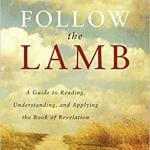
Friday: Read Revelation 7:9-17
Thus far in the narrative of Revelation, we have seen that the people of God are included among those who suffer from the effects of the first four Seals (6:1-8).[3] Their suffering led to the cry of the martyrs under the altar, “How long?” (6:10).
In the present interlude then, John first provides comfort to the people of God with the knowledge that they have been sealed and are under God’s divine protection (7:3-8). Now, in the account of the Great Multitude, we learn that they are the ones who will be brought through the Great Tribulation (13), and into the glorious presence of God and the Lamb (15-17).[4] The interlude, in other words, is both a reminder for the people of God that God is sovereignly protecting them in the present and it is a looking forward to their ultimate destiny.
The significance of these promises is well capture by Barbara Rossing: “Think how wonderful this promise of unlimited food must have been in the face of the poverty and hunger that haunted many of John’s communities in the first century: abundant fruit, an ever-bearing tree, growing beside the river of life with its water flowing as a gift for everyone. In contrast to the economy of Babylon/Rome, which was characterized by famine and hunger and an exploitive system of taxation that squeezed peasants and the poor, God’s holy city provides enough food to all.”[5]
Questions to ponder/discuss:
- Rev 7:13-17 is one of the great passages of hope in the NT. Spend time each day for the next week to ten days meditating on and memorizing these verses. Then, anytime you are having a tough day, come back to this passage and reflect on what is awaiting those who overcome.
- That the Great Multitude and the 144,000 are the same group should be understood in terms of promise and fulfillment. That is, God called Abraham (Gen 12:1-3; 17:5) to be a blessing to the nations. In doing so, he noted that Abraham’s descendants would be as numerous as the stars in the sky (Gen 15:5). In John’s account, what began as a countable number of “Israelites” (144,000), has now become a “Great Multitude which no one could count” (9). God is faithful to His promises. He promised Abraham that his descendants will be innumerable and that they will be a blessing to the nations.
For those who wish to investigate the seven Seals further, I have written several blogs on them. See: 7 Seals and Revelation;
Our goal is to keep these posts free of charge. I do not intend to ever hide them behind a paywall. I can only do this if those of you who have been blessed by them and can afford to give ($5, $10, $25, or more/month) do so. You can give a tax-deductible contribution by following this link.
Please share this post and let others know about determinetruth.
If you wish to view this blog on your smartphone through the Determinetruth app simply download the “tithe.ly church” app on your smartphone and insert “determinetruth” as the church name you wish to follow. Once it is loaded, simply click on the “blog” icon and it will automatically load.
If you would like to have Rob speak at your church or organization in person or via zoom, please let us know by filling out the contact info on the Contact me tab on this site.
[1] This guide is meant to be done either as a group study over the course of 2 or 4 meetings (Day 1-5; 6-10; 11-15; 16-20) or as a private devotion over the course of 4 weeks (or a calendar month—5 lessons per week).
[2] John will use the technique of hearing and seeing several times in the book of Revelation.
[3] Again, this does not mean that the nations do not suffer also. War, famine, and wild beast kills indiscriminately.
[4] The suggestion that the Great Multitude are brought “out of” the great tribulation in the sense that they were “raptured” away so that they did not have to suffer runs contrary to much in the NT. For one, the NT never promises that the people of God will be taken from tribulation but that they will persevere through it. Jesus, Himself, prayed: “I do not ask You to take them out of the world, but to keep them from the evil one” (John 17:15).
[5] Rossing, Barbara R. The Rapture Exposed (pp. 154-155). Basic Books. Kindle Edition.







